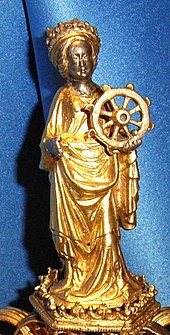Faculty of Philological and Cultural Studies at the University of Vienna

The Philological and Cultural Studies Faculty of the University of Vienna is one of the faculties of the University of Vienna . It is located in the main building , Universitätsring 1, Innere Stadt (1st district).
the faculty
With 20,000 students, the Faculty of Philology and Cultural Studies is the largest at the University of Vienna . 64 professors and around 250 lecturers and assistants work here. (Figures 2006) Matthias Meyer has been Dean of the Faculty since autumn 2012 .
From today's reorganized faculty, two rectors of the University of Vienna have been appointed over the past decade ( Alfred Ebenbauer and Wolfgang Greisenegger ). In addition, two top positions in the Austrian Academy of Sciences were filled by professors from the faculty (Herwig Friesinger and Werner Welzig ).
Until 1997, the institutes of the then humanities faculty were spread over around twenty different locations. Today there are essentially only two locations left: the main building on the Ring and the campus . The central subject of the Faculty of Philological and Cultural Studies is the human being who acts in society in his or her historical condition and in the light of his / her cultural achievements, especially in the area of language, literature and music.
history
Teaching, research and administration at the faculty are the result of more than 600 years of development, which began in the founding year 1365 - the founding deed is now in the university's archive - with the so-called artist faculty in the sense of the medieval university concept. With the help of the septem artes liberales (grammar, rhetoric, dialectics, arithmetic, geometry, astronomy, music), a comprehensive, “encyclopedic” general education was acquired, which was considered a prerequisite for studying theology, law and medicine. This system persisted despite all the changes in detail over many phases of upswing and decline up to the revolutionary year 1848. It was not until 1849 that a - now equal - faculty of philosophy was founded, which made enormous progress in the humanities and natural sciences.
Transdisciplinarity
The Faculty of Philological and Cultural Studies feels deeply connected and committed to the humanistic values cultivated by the University of Vienna. The Philological and Cultural Studies Faculty now includes 13 institutes. With their wide range of research and teaching, they ensure that the view is expanded beyond the borders of the country and beyond Europe and that competencies for political, cultural and economic relations with all regions of the world are developed and conveyed. The disciplines of the faculty examine cultures in their linguistic and historical dimensions, in their regional, national, ethnic, social and gender-specific differences as well as in their supra-regional and global contexts. This diversity of subject areas, which is unique in Austria, contributes significantly to its internationally recognized position. So z. B. African Studies, Finno-Ugric Studies, Dutch Studies, Scandinavian Studies, Arabic Studies, Turkology, Islamic Studies, Indology, Tibetology, Sinology, Koreanology and Japanese Studies are only offered in Vienna. Theater, film and media studies, Asian studies and musicology are continuously expanded. A number of specialist areas are also in the process of being set up and are already in the first concrete approaches: Celtology, Lusitan Studies, Neo-Latin Studies, Ukrainian Studies.
The institutes for German, English, Romance and Slavonic studies also take into account the broad spectrum of European languages. Thus the transdisciplinarity achieved today and the high degree of synergy effects are only possible through the breadth of the diversity available at the faculty. In teaching, more than 50 new curricula are being developed according to the Bologna system, plus the integration of new media and technical aids into the faculty teaching. Such skills are becoming increasingly important in the course of globalization.
Institutes
- Institute for African Studies
- Institute of English and American Studies
- Institute for European and Comparative Linguistics and Literature Studies, with the following departments:
- Department for Finno-Ugric Studies
- Dutch Department
- Department of Scandinavian Studies
- Comparative Literature Department
- Institute for German Studies
- Institute for Classical Philology, Middle and New Latin
- Institute for Musicology
- Institute for Oriental Studies
- Institute for East Asian Studies
- Institute for Romance Studies
- Institute for Slavic Studies
- Institute for Linguistics
- Institute for South Asian, Tibetan and Buddhist Studies
- Institute for Theater, Film and Media Studies
literature
- 1000 Years of Austria - Paths to an Austrian Identity ; Lectures on the occasion of the Dies Academicus of the Humanities Faculty of the University of Vienna on January 10, 1996, ed. Franz Römer, WUV-Universitätsverlag (Vienna 1997);
- History and Spirit, University Campus Vienna ; ed. Alfred Ebenbauer , Wolfgang Greisenegger, Kurt Mühlberger , Verlag Holzhausen (Vienna 1998);
- Humanities Vienna - Topics, projects, contacts, autumn 1999 , ed. Working group for public relations at the humanities faculty of the University of Vienna in cooperation with the “Wiener Vorlesungen”, (Vienna 1999);
- Future with contaminated sites. The University of Vienna 1945 to 1955 , ed. M. Grandner, G. Heiss and O. Rathkolb, Innsbruck-Vienna-Munich-Bozen 2005 (= cross-section 19), the contributions are largely dedicated to the philological and historical subjects.
Web links
Coordinates: 48 ° 12 '47 " N , 16 ° 21' 38.4" E

